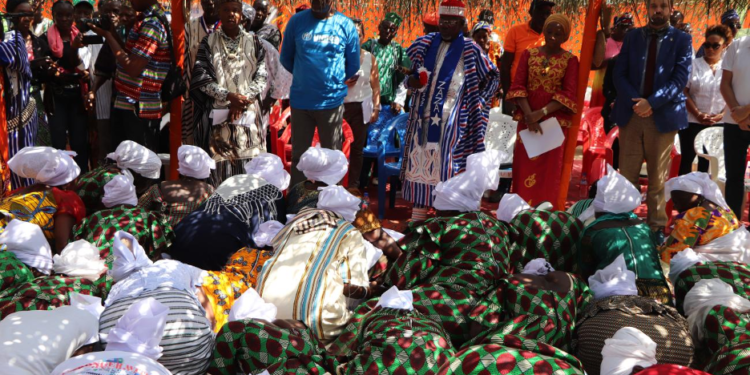MONROVIA – In 2023, Chief Zanzan Karwor, Chairperson of the Council of Chiefs and Elders of Liberia (NACCEL), announced a ban on Female Genital Mutilation (FGM) in the country. The announcement was made at a ceremony in Sonkay Town, rural Montserrado County, to commemorate the International Day of Zero Tolerance against FGM.
Report By Tina Mehnpaine with The Liberian Investigator
“On behalf of my people, by the power vested in me as Chairman of all the traditional Chiefs in 15 Counties, FGM is banned in this country,” declared Chief Karwor.
The proclamation meant that women traditional leaders, known as “Zoes,” would no longer be allowed to take young girls or women into the Sande bush, and all activities related to FGM were halted. The women handed over their tools and permits used for initiating people, symbolizing adherence to the declaration.
At the ceremony, Massa Kandakai, the Head Zoe of Montserrado County, acknowledged Chief Karwor’s pronouncement.
“Once our Chief has ordered us to stop, we accept the ban on FGM, and we will not do it,” she said. Despite the declaration and subsequent attestation by Zoe Massa, no punishment was prescribed for violators.
FGM is considered an integral part of culture and tradition in Liberia, having been practiced on half of the girls and women in the country, according to UNICEF. Globally, UNICEF estimates that over 230 million girls and women have undergone FGM, with Africa accounting for the largest share at over 144 million. Asia follows with over 80 million, and the Middle East with a further 6 million. Additionally, 1-2 million are affected in small practicing communities and destination countries for migration worldwide.
Women’s rights advocates argue that FGM is a violation of women’s rights and call for its total elimination. However, practitioners see it as a way to honor cultural traditions passed down by their ancestors. FGM has no health benefits and poses severe health risks, including pain, bleeding, obstetric fistula, and increased susceptibility to HIV, according to the World Health Organization.
What is in the Ban?
With support from the European Union through the Spotlight Initiative, UN Women has constructed four heritage centers in Montserrado, Grand Cape Mount, Lofa, and Nimba to provide alternative economic livelihood programs for traditional practitioners. These centers will serve as dedicated learning spaces for traditional practitioners, young women, and girls to acquire new skills. The former practitioners will learn crafts such as cloth making, beadwork, and farming. UN Women plans to establish similar centers in the 11 counties that practice FGM in Liberia, enabling former practitioners to generate income through alternative means.
Is the Ban Enforceable?
Since the FGM ban was pronounced, concerns have emerged about its effectiveness and the mechanisms for monitoring and enforcement. No legislation has been passed to prohibit FGM in Liberia. Two anti-FGM bills, seeking to permanently outlaw the practice, are currently pending before the Liberian Legislature.
The ban announced by Chief Karwor is not the first of its kind. In February 2022, he announced a three-year suspension on FGM. In 2018, former President Ellen Johnson Sirleaf signed an executive order banning FGM for girls under 18, but the ban expired in February 2019.
This year, the Community Health Initiative (CHI) and the Organization for Women and Children (ORWOCH) filed a writ of habeas corpus against Hannah Tarr, the head Zoe in Corpus Kpaans Town, rural Montserrado County. Tarr was accused of abducting four young women to forcibly initiate them into the Sande Society. The two civil society organizations described the forced initiation as a violation of the victims’ constitutional rights.
Attorney Mmonbeydo Nadine Joah, representing the petitioners, argues that a writ of habeas corpus is necessary to compel the respondents to produce the abducted women and ensure their safe return. Joah and her colleague have questioned the effectiveness of the FGM ban.
“The FGM ban is not effective,” Joah said. “Even as we try to pass the FGM law, we need to make sure that those taking children into the bushes are held accountable.” To ensure the ban’s effectiveness, Joah advocates for a multisectoral approach involving all sectors.
Liberia’s dual legal system honors both customary and statutory laws, as stated in Article 5(b) of the Constitution: “The Republic shall… preserve, protect and promote positive Liberian culture, ensuring that traditional values which are compatible with public policy and national progress are adopted and developed as an integral part of the growing needs of the society.”
This means traditional laws and regulations declared by traditional authorities are binding on community members.
“A regulation or mandate coming from a traditional chief is binding on members of his traditional community who practice said customs or traditions,” says Attorney Alpha Daffae Senkpeni. “The only condition is that the regulation or traditional law cannot violate the Constitution. This is why the regulation banning FGM has the force of law, but there are other reasons why some traditional Zoes are not abiding.”
Senkpeni, a journalist who has extensively covered human rights issues, emphasizes that to completely outlaw FGM, the Legislature must enact a statute that has the force of law, in addition to collaborating with rural communities, the custodians of these customs and traditions.









Discussion about this post